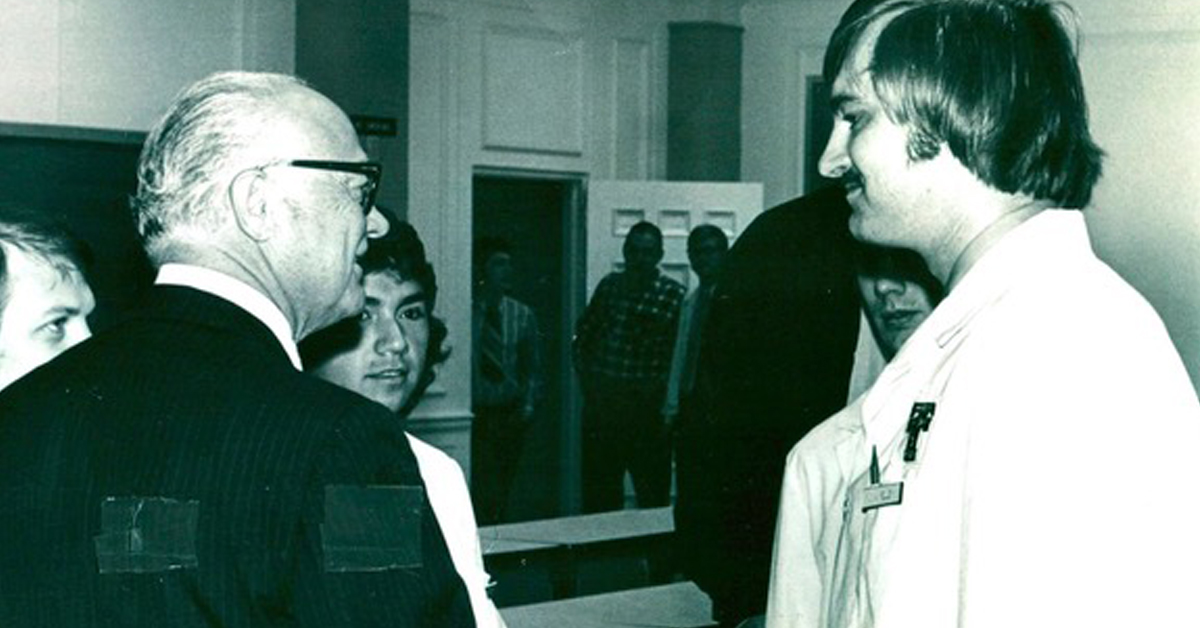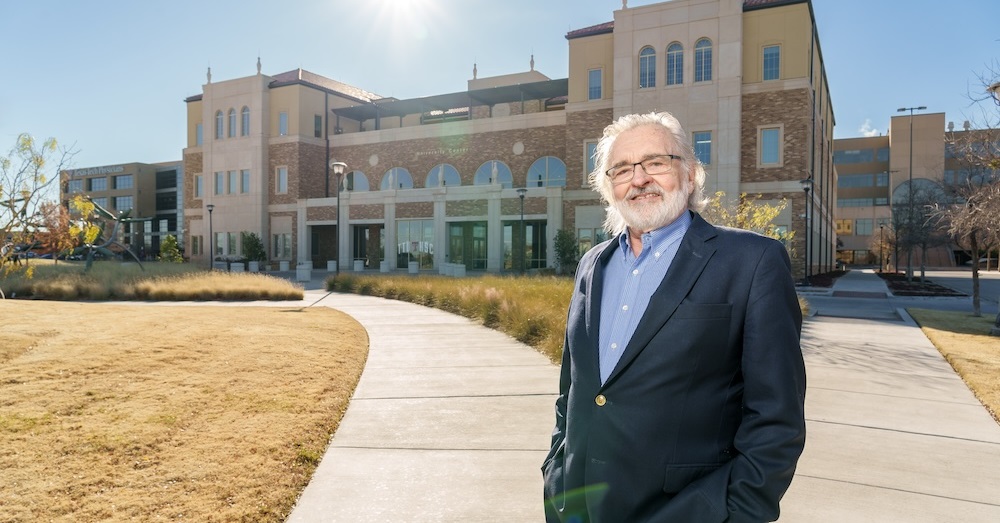After More Than 50 Years of Service, Last Founding TTUHSC Faculty Member Retires to Teach How the Brain Learns

John Pelley, Ph.D., joined the Texas Tech School of Medicine at its inception in 1972 to teach biochemistry and begin a research program in biochemistry. However, his career path was destined to be influenced by the nature of a new medical school. As he points out, “I arrived with research interests in biochemistry and I’m leaving with research interests in education. I’ve had at least three different careers all under one roof.”
During one of those “careers,” he confronted a situation that biochemists are not trained to manage: failing medical students. This piqued an interest in the science of how people learn and led to his self-description as a “biochemist who was distracted by education.”
In the early days at Texas Tech University’s Drane Hall, the original location of the TTUHSC School of Medicine was often referred to as “across the tracks,” referring to railroad tracks now long ago removed. One of many photos taken on the first day of classes hangs in his office as a memento of the opening ceremonies when then Gov. Preston Smith was present.

John Pelley, Ph.D.
“As I remember the story, Gov. Smith said he would approve the UT Houston medical school if ours also got approved,” Pelley recalled. “Even with our medical school approved, we became a political target because of our start-up and every biennium for the first decade, there was a legislative bill to close our school. We would undergo dramatic low morale until the final legislation in May was finally approved showing we were still alive.”
From chalkboards to overhead projectors, and Power Point to YouTube, Pelley has worked with every past School of Medicine class and witnessed changes in higher education from many angles. In addition to teaching and conducting research, he served as the admissions dean, academic affairs dean, and interim biochemistry department chair, though not all at once.
“My career took a turn away from bench science to the science of learning during my service as academic affairs dean,” Pelley said. “I had the responsibility of advising at-risk students, but I had no advice better than to keep working hard. Scientists don’t just walk away from difficult problems; they try to solve them. This motivated me to start learning what was causing highly select students to struggle on their exams.”
After hearing about insights from the Myers Briggs Type Indicator, Pelley began to look further into how the brain learns. His work through the years has garnered him recognition as an expert in how people learn. He currently has a website, “The SuccessTypes Medical Education Site.”
“Its purpose is to inspire and educate students on how to transform themselves from receivers of information into skilled producers of their own knowledge,” Pelley said. “Likewise, educators can be inspired to transform themselves from providers of information into ‘catalysts’ that help students discover and decide. People who can think well – use their brain the way it was intended – are healthier and happier their whole lives. You can't do better than that. My retirement really is an opportunity to continue to create a way to communicate to other educators the ways we can teach students how to learn.”
In recognition of his contributions to medical education, Pelley was awarded the AOA Robert J. Glaser Distinguished Teacher award in 2010 at the annual AAMC meeting. He also presented a TED Talk in 2014, “Body Building for the Brain,” and authored an invited chapter on Learning Styles in an education textbook.
The TTUHSC Lubbock campus has grown through Pelley’s more than 51 years at the School of Medicine. An academic classroom building, university center, academic event center and the Texas Tech Physicians clinics stand in the original dirt lots where Pelley, the faculty and students parked. As Pelley leaves this chapter of his professional career, he fondly remembers the sense of family.
“We have a sense of community,” Pelley said. “When you walk in, if you're a new student, you feel you belong. There is a place for you. The faculty that come here like the feeling of collaboration they see in the community here. That is something I feel I was a part of.”
Related Stories
From Backpacks to White Coats: TTUHSC School of Medicine Invests in Tomorrow’s Healers Today
As part of its partnership with JAMP, the TTUHSC School of Medicine Admissions Office recently partnered with Alderson Elementary School in the Lubbock Independent School District to provide critical school supplies.
Amy Purdy Delivers Keynote Address at TTUHSC Laura W. Bush Institute for Women’s Health Power of the Purse Luncheon
American snowboarder, motivational speaker and author Amy Purdy delivered the keynote address at the Power of the Purse luncheon and fundraiser on April 10.
Texas Tech University Health Sciences Center Unveils Craddicks’ Honorary Name for Physician Assistant Studies Program
TTUHSC unveiled a new name for a decade-old program on Oct. 15. The Nadine and Tom Craddick Physician Assistant Studies Program honors Rep. Tom Craddick and his wife Nadine.
Recent Stories
The John Wayne Cancer Foundation Surgical Oncology Fellowship Program at Texas Tech University Health Sciences Center Announced
TTUHSC is collaborating with the John Wayne Cancer Foundation and has established the Big Cure Endowment, which supports the university’s efforts to reduce cancer incidence and increase survivability of people in rural and underserved areas.
TTUHSC Receives $1 Million Gift from Amarillo National Bank to Expand and Enhance Pediatric Care in the Panhandle
TTUHSC School of Medicine leaders accepted a $1 million philanthropic gift from Amarillo National Bank on Tuesday (Feb. 10), marking a transformational investment in pediatric care for the Texas Panhandle.
Texas Tech University Health Sciences Center Permian Basin Announces Pediatric Residency Program Gift
TTUHSC Permian Basin, along with the Permian Strategic Partnership and the Scharbauer Foundation, Feb. 5 announced a gift that will fund a new pediatric residency.
